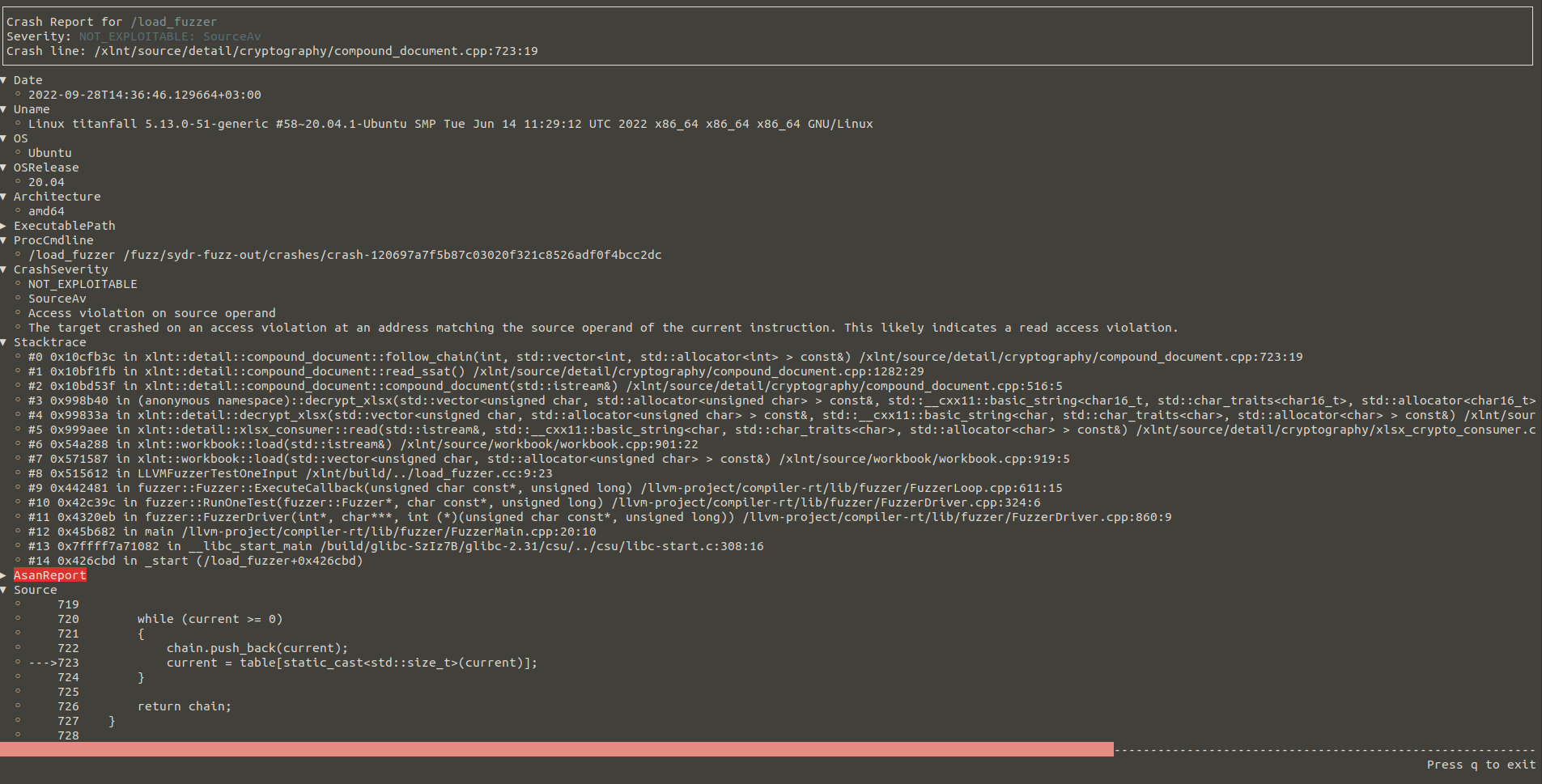CASR – collect crash reports, triage, and estimate severity. It is based on ideas from exploitable and apport.
CASR is maintained by:
- Andrey Fedotov <fedotoff@ispras.ru>
- Alexey Vishnyakov <vishnya@ispras.ru>
- Georgy Savidov <avgor46@ispras.ru>
CASR is a set of tools that allows you to collect crash reports in different
ways. Use casr binary to deal with coredumps. Use casr-san to analyze ASAN
reports. Try casr-gdb to get reports from gdb.
Crash report contains many useful information: severity (like exploitable),
OS and package versions, command line, stack trace, register values,
disassembly, and even source code fragment where crash appeared. Reports are
stored in JSON format. casr-cli is meant to provide TUI for viewing reports.
Reports triage (deduplication, clustering) is done by casr-cluster.
Triage is based on stack trace comparison from gdb-command.
Explanation of severity classes could be found here. You could take a closer look at usage details here.
- Install Rust. Instructions can be found here.
- Clone CASR repository:
$ git clone https://github.com/ispras/casr
- Build CASR:
$ cargo build --release
- Install runtime dependencies:
$ sudo apt install gdb python3 python3-pip lsb-release
$ sudo -H python3 -m pip install numpy scipy
Instead of steps 2-3 you may just install Casr from crates.io:
$ cargo install casr
Create report from coredump:
$ casr -f tests/casr_tests/bin/core.test_destAv -e tests/casr_tests/bin/test_destAv -o destAv.casrep
Create report from sanitizers output:
$ clang++ -fsanitize=address -O0 -g tests/casr_tests/test_asan_df.cpp -o test_asan_df
$ casr-san -o asan.casrep -- ./test_asan_df
Create report from gdb:
$ casr-gdb -o destAv.gdb.casrep -- tests/casr_tests/bin/test_destAv $(printf 'A%.s' {1..200})
View report:
$ casr-cli tests/casr_tests/casrep/test_clustering_san/load_fuzzer_crash-120697a7f5b87c03020f321c8526adf0f4bcc2dc.casrep
Create report for program that reads stdin:
$ casr-san --stdin seed -o san_bin.casrep -- ./san_bin
Deduplicate reports:
$ casr-cluster -d tests/casr_tests/casrep/test_clustering_gdb out-dedup
Cluster reports:
$ casr-cluster -c out-dedup out-cluster
When you have crashes from fuzzing you may do the following steps:
- Create reports for all crashes via
casr-sanorcasr-gdb(if no sanitizers are present). - Deduplicate collected reports via
casr-cluster -d. - Cluster deduplicated reports via
casr-cluster -c. - View reports from clusters using
casr-cli.
Feel free to open issues or PRs! We appreciate your support!
Please follow the next recommendations for your pull requests:
- compile with stable rust
- use
cargo fmt - check the output of
cargo clippy --all - run tests
cargo test
Savidov G., Fedotov A. Casr-Cluster: Crash Clustering for Linux Applications. 2021 Ivannikov ISPRAS Open Conference (ISPRAS), IEEE, 2021, pp. 47-51. DOI: 10.1109/ISPRAS53967.2021.00012 [paper] [slides]
@inproceedings{savidov2021casr,
title = {{{Casr-Cluster}}: Crash Clustering for Linux Applications},
author = {Savidov, Georgy and Fedotov, Andrey},
booktitle = {2021 Ivannikov ISPRAS Open Conference (ISPRAS)},
pages = {47--51},
year = {2021},
organization = {IEEE},
doi = {10.1109/ISPRAS53967.2021.00012},
}Licensed under Apache-2.0.
